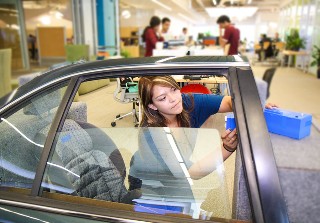Dec 22 2015
Nancy Dominguez studied mechanical engineering because she wanted to create something that would make a difference.
 Through an internship with AT&T Foundry, Nancy Dominguez, a mechanical engineering senior who will graduate Friday, developed a safety device for children that garnered significant media attention. The project also helped her land a job developing new technology for AT&T.
Through an internship with AT&T Foundry, Nancy Dominguez, a mechanical engineering senior who will graduate Friday, developed a safety device for children that garnered significant media attention. The project also helped her land a job developing new technology for AT&T.
She just didn’t expect to be able to do that so soon. The senior — who will graduate Friday — designed a prototype for a potentially lifesaving device during a summer internship at the AT&T Foundry, an innovation center for developing products and services.
Dominguez’s device to prevent children from being left in hot cars received substantial media attention. It also helped her land a job before she receives her diploma from the Erik Jonsson School of Engineering and Computer Science. Dominguez recently accepted a position with AT&T’s Technology Development Programs. She starts work in January.
The device, a box that can attach to a car window, uses a motion detector and an infrared sensor to identify heat emitted from a body inside the car. If it senses that someone has been left in the car, it sends a text message to warn the caregiver first, and then police if there’s no response from the caregiver.
With a microphone clipped to her collar, Dominguez demonstrated the technology during an interview with Fox affiliate KDFW-TV in Dallas over the summer. It was one of several media interviews this year about the device.
“This is something that is a huge problem and you don’t see a lot of solutions for it,” Dominguez said. “I think it’s time an effective and good solution was made.”
Dominguez said she did not expect to make such an impact until she had worked many years and climbed the professional ladder.
The AT&T Foundry internship put her on the fast track. She got the internship after AT&T Foundry reached out to the University’s Academic Bridge Program, which recruits and supports high-potential, first-generation college students from Dallas ISD and surrounding districts.
In addition to working on a Web app and a water cooling system during the summer 2014 internship, Dominguez was encouraged to work on a personal “passion” project. She said she got the hot car sensor idea from her mom.
Since her internship, Dominguez has continued to work with AT&T Foundry, which is developing the idea. AT&T Foundry also sent her to New York City in May to demonstrate the prototype at an innovation showcase.
“Nancy’s exactly the kind of person we hope to find as an intern,” said Mike Albrecht, AT&T Foundry innovation coach. “She was able to go from never having done programming or electronics work before, to putting together a working prototype that involved both disciplines in three weeks. To have her at the AT&T Innovation Showcase in New York was also great because it showed the continuity of the project.”
Dominguez said she hopes her experience will inspire others.
“After creating this device and getting publicity, I realized I could actually be the one coming up with the ideas and impacting the people around me like I had originally wanted to do,” Dominguez said. “As an engineer, having a creative mind, being passionate about your ideas and your work, I think anyone can use their scientific understanding of how the world works to create something that can make a big, positive impact at any age.”